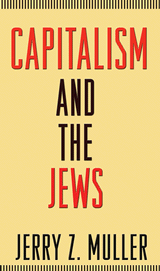Capitalism and the Jews
 No, you have not just stumbled on a neo-Nazi website by mistake. This topic has long been radioactive for obvious reasons, but some scholars are finally getting over it, as shown by a great book by Jerry Z. Muller by the same title (Princeton U. Press, 2010). The obvious patterns of interest:
(1) Some capitalists are Jews
No, you have not just stumbled on a neo-Nazi website by mistake. This topic has long been radioactive for obvious reasons, but some scholars are finally getting over it, as shown by a great book by Jerry Z. Muller by the same title (Princeton U. Press, 2010). The obvious patterns of interest:
(1) Some capitalists are Jews
(2) Some anti-capitalists are anti-Semites
Both facts have been caricatured. It does not follow from (1) that all Jews are capitalist exploiters, and it does not follow from (2) that all anti-capitalists are anti-Semites.
Jews were prominent in capitalist history in particular as financiers and traders (“middlemen”). Famous banking examples are the Rothschilds in Europe and the Guggenheims in New York. In Hungary in the 1920s, 85 percent of bank directors and owners were Jewish. Famous Jewish traders in America were the Filenes (yes, THAT department store) and Levi Strauss (a trader before he stumbled across that whole denim thing).
Trade and finance are what is known as “contract-intensive” sectors. Unlike cash-and-carry transactions, transactions in these sectors need to separate delivery and payment. The huge need for a mechanism to enforce contracts is because one party can always abscond with the money or goods. One informal mechanism to enforce contracts is doing transactions within a tightly knit ethnic group with high trust between its members, backed up by the threat of expulsion from the group if you cheat. A previous post discussed how many ethnic minorities form business networks.
The Jews just happened to form the largest networks in the two most critical sectors for the emergence of European capitalism – trade and finance. Unfortunately, these two sectors have also been the ones that attract the most hatred from those opposed to capitalism, who can only see unproductive middlemen, speculators, and financial tricksters.
Actually, this is how European Jews wound up in those sectors in the first place, since European Christians traditionally banned “usury” in finance and “speculation” in trading goods. They also often banned the Jews from landowning and agriculture. So the outsiders, the Jews, were forced into trade and finance. When the Industrial Revolution conferred wealth on people good at trade and finance , there was the tragic anti-Semitic backlash against Jews for operating in sectors they had been forced into by previous waves of anti-Semitism.
Hatred of trade and finance is still very much alive today, in both non-racist and anti-Semitic varieties. For the latter, take Osama bin Laden’s Letter to America in November 2002:
You are the nation that permits Usury, which has been forbidden by all the religions. Yet you build your economy and investments on Usury. As a result of this…the Jews have taken control of your economy…and now control all aspects of your life.
To keep reiterating over and over, it would be fallacious and unfair to equate any criticism of Finance (some of them very well-deserved) with anti-Semitism or Osama bin Laden. Indeed, another striking phenomenon that Muller discusses is that some Jews have also played prominent parts in anti-capitalism, beginning with the partly-Jewish Marx through Trotsky (the Nazis absurdly blamed the Jews for Both Capitalism and Communism), Israel’s strong socialist traditions, and continuing through some of today’s most prominent anti-globalization writers. I won’t try to analyze Jewish anti-capitalism here (read Muller).
Yet for those who ARE anti-Semitic, anti-capitalist, and anti-Western all at the same time today, anti-Semitism is providing a lot of the rocket fuel for the anti-capitalism and anti-Westernism. As Ian Buruma and others have pointed out, some anti-Western movements around the world today are drawing upon anti-capitalist and anti-Semitic ideas that originated in the West itself.
 From Aid to Equality
From Aid to Equality
